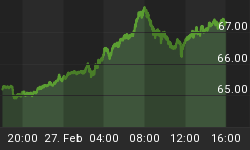The markets have fully priced in a 25bp cut in the Bank of England's repo rate tomorrow, the first change in interest rates in a year, and the first cut in a little over two. As the data over the past couple of weeks have firmed up expectations for a rate cut, sterling has actually risen against the dollar and the euro - perhaps because the markets realize that an August cut will not be the start of an aggressive easing trend.

First, the data. Since we last wrote about the UK on July 20 ("UK's BoE Is Increasingly Dovish), there's been enough disconcerting news to convince at least one more of the nine members of the Monetary Policy Committee (MPC) to ease. June retail sales jumped 1.3% on the month, but were up a more subdued 1.7% on the year - better than the 1.3% annual growth seen in May, but likely boosted by a bout of warmer weather. Yesterday's retail sales survey from the Confederation of British Industry was unequivocally glum - sales declined for the fifth straight month in July, with a balance for the month of -18. More disturbing, the underlying balance in the three months to July came in at -15, the lowest in the survey's 22-year history. Overall consumer borrowing rose just £1.3 billion in June, bringing the annual rate of increase to 12.5% - which sounds healthy, but is actually the weakest in nearly four years.

Housing sector data have confirmed a stabilization of the market at lower levels - just what the BoE wanted to see. According to BoE data, mortgage lending in June rose a relatively-subdued £7.5 billion (up 10.8% on the year, the slowest since March 2002) and mortgage approvals remained steady at 96,000 for the month. Finally, the CIPS construction survey reported solid growth in house building in July.
Most important, preliminary Q2 GDP rose just 0.4% on the quarter and 1.7% on the year - weaker than the 2.6% that the BoE had forecast in its May Quarterly Inflation Report, and making four consecutive quarters of below-expectations GDP growth. The manufacturing sector fell into recession in Q2, with output falling by 0.7% on the quarter (-0.9% in Q1). The CIPS manufacturing sector purchasing managers' index contracted for the fourth month in a row in July, to 49.2 (49.6 in June), suggesting manufacturing weakness has continued into the third quarter.

At least one of the members of the MPC who had voted "no change" at the July meeting was sounding more dovish last week - Deputy Governor Large commented that the slowdown in the housing market and worries about the future might be forcing consumers to cut back spending, and that it was difficult to assess whether the current slowdown would prove to be temporary.
We do not yet know the BoE's latest inflation outlook - the MPC members will be seeing some of the data from the August Quarterly Inflation report today, but the full report won't be publicly released until August 10th. We assume there's nothing scary in the inflation outlook. So, with consumption much weaker and the manufacturing sector struggling, the repo rate looks set to go down to 4.50% tomorrow.
But, don't look for a whole series of rate cuts over the coming months - maybe one more before year's end at the most. The service sector - the backbone of the economy - is still doing fine. Today's service sector business activity index from CIPS rose to 56.3 in July, up from 55.8 in June. (And, for good measure, prices charged rose at their weakest pace in one-and-a-half years, while input costs saw their mildest rises in nearly the same period. All told, despite sterling's recent slide and markedly higher global oil prices, inflation in the service sector remains tame.)

Finally, the GfK consumer confidence index actually rose from -3 in June to -1 in July, while much of the increase in mortgage approvals seen in June apparently was spurred by expectations of lower interest rates by the end of the summer. Consumers in the UK have scaled back, not gone into a funk.















